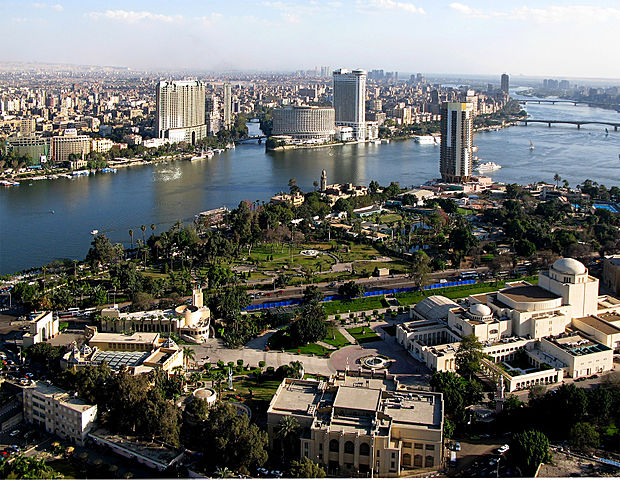Egyptian Immigration to Canada

With continuing unrest in Egypt over the past several years, many Egyptians have considered immigrating to Canada as a means to find a more stable and prosperous residence for themselves and their families. Unfortunately, the road from Canada to Egypt is often fraught with delays because of the large number of requests to immigrate, as well as the changing political situation in Egypt.
View from Cairo Tower [Public Domain]
One gets a sense of the difficulties one may face when attempting to immigrate immediately upon visiting Citizenship and Immigration Canada’s website “Visa office in Cairo, Egypt.” A box at the top of the page informs visitors that “due to disruptions, the services of the Visa Section of the Embassy of Canada to Egypt may experience unusual delays. The Visa office capacity to respond to inquiries is limited at this time. This situation may affect processing times for temporary resident applications (for visitors, students and temporary workers.)”
In order to immigrate to Canada a prospective immigrant must fall into one of nine categories: a skilled worker/professional; skilled tradesperson; a business immigrant; a provincial nominee; a Quebec-selected skilled worker or business person; a person with “Canadian experience”; a family sponsor; an international adoption; or a refugee.
The skilled worker/professional category is reserved for those meeting “certain education and work experience requirements [who] want to settle and work in Canada (outside of Quebec.)” (The standards for immigration into Quebec are different from those of Canada as a whole, as Quebec sets much of its own immigration policy.) Applicants under this category must have either a valid offer of arranged employment or be an international student enrolled in a PhD program. Once these minimum requirements are met, six selection factors are applied, including, testing the immigrant’s education, English/French language skills, work experience, age, whether employment in Canada has been arranged, and the immigrant’s adaptability. Each of these criteria involves the awarding of points. For instance, a person under 16 receives 0 points on the age scale; however, every year until they reach 21 they accumulate an additional two points (in other words, a 17 year old receives 2 points, an 18 year old 4, and so on.) Persons between the age of 21 and 49 receive 10 points; at 50, the process reverses, and one loses two points for each year of age, until, at the age of 54, a person receives no points for age once again.
Business immigration status is reserved mainly for very persons. Three subcategories exist, of “investors,” “entrepreneurs,” and “self-employed people.” An investor must be able to make an investment of C$800,000 and show a net worth of C$1.6 million (which must have been obtained legally.) Self-employed people are limited to farmers, athletes, artists and cultural contributors. The entrepreneur category has been temporarily suspended since July 1, 2011.
Provincial nominees must be nominated by a Canadian province or territory on criteria that differ between each. These nominees are expected to “have the skills, education and work experience needed to make an immediate economic contribution to the province or territory that nominates them.” Similarly, the “Quebec-selected skilled workers and business people” category allows the Quebec government to select immigrants to work in that province. The Canadian experience class permits people who have recent Canadian work experience to apply to settle and work in Canada (outside of Quebec.)
Additional categories are available for family sponsorship (where one has a family member already in Quebec), adoption of an international child. The final class, refugees, is available to those whose removal from Canada would “subject them to a danger of torture, a risk to their life or a risk of cruel and unusual treatment or punishment.” Citizenship and Immigration Canada relies upon the United Nations High Commissioner for Refugees, as well as other referral organizations and private sponsorship groups, to identify and refer refugees for resettlement in Canada. The process of emigrating from Canada to Egypt can be fraught with delays and pitfalls. Many of the difficulties deal with family sponsorship (in which a person with Canadian citizenship attempts to sponsor a non-citizen family member) but delays can affect any application.
![View from Cairo Tower By Raduasandei at en.wikipedia Later version(s) were uploaded by Arad at en.wikipedia. (Original text : Asandei Radu (Edited: (Sharpened, Noise Reduced, Distortion Reduced, Tilt fixed and Down-sampled) by Arad M)) Rededited (Sharpened): by Arad Mojtahedi) [Public domain], from Wikimedia Commons](https://upload.wikimedia.org/wikipedia/commons/thumb/b/b2/View_from_Cairo_Tower_31march2007.jpg/620px-View_from_Cairo_Tower_31march2007.jpg)